Published Feb 13, 2018
EXCLUSIVE INTERVIEW: Sonequa Martin-Green on Season One of Discovery
EXCLUSIVE INTERVIEW: Sonequa Martin-Green on Season One of Discovery
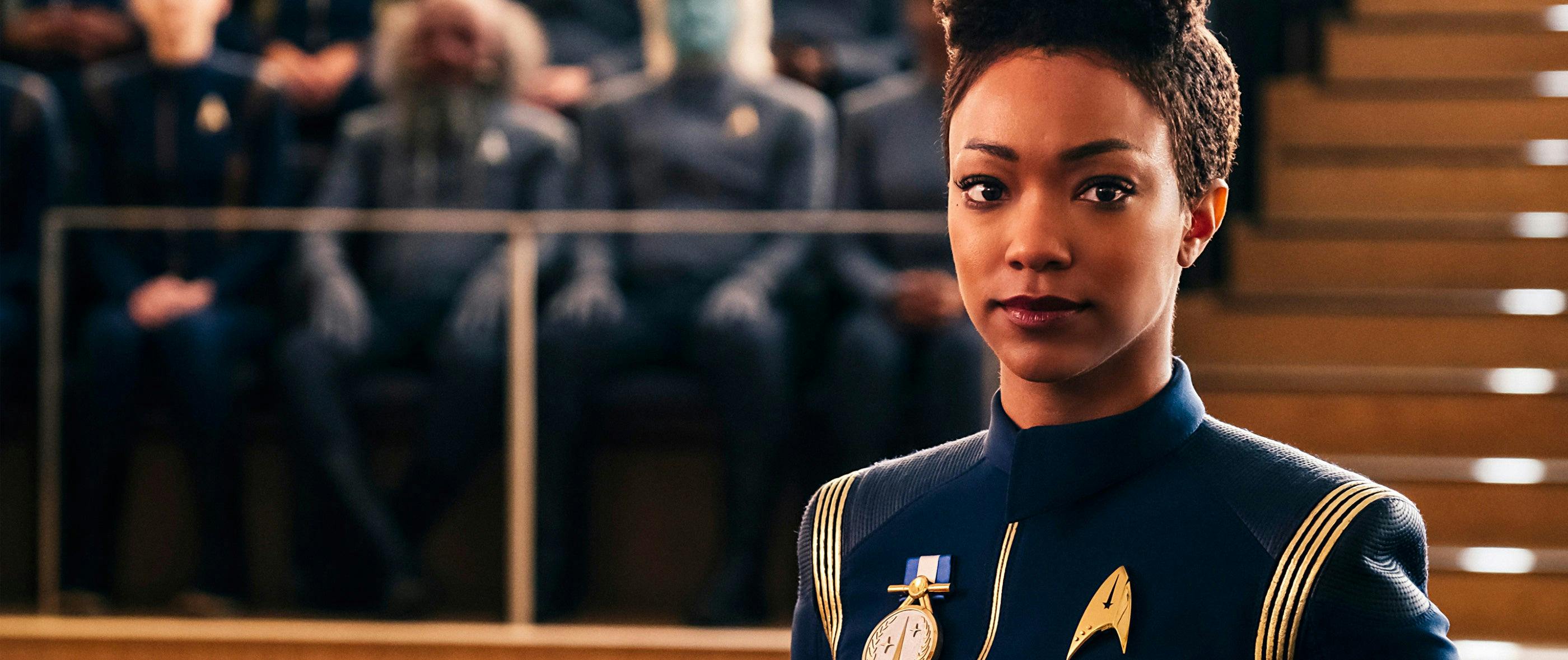
Michael Burnham experienced pretty much everything and anything over the course of Star Trek: Discovery’s first season. She was, among other things, a mutineer, pariah, lover, friend, butt kicker, dupe, mentor, heartbreaker, idealist, daughter, redemption seeker, and the ultimate spokesperson arguing on behalf Starfleet’s principles. Sonequa Martin-Green, with those exquisitely expressive eyes and alternately tough and soothing voice, brought it all to life episode after episode, anchoring Discovery with a beating heart and as a relatable protagonist. Right after a post-“Will You Take My Hand?” taping of After Trek this past Sunday, Martin-Green sat with StarTrek.com for a revealing, emotional interview…
Going into Discovery, what were your expectations and how different was reality?
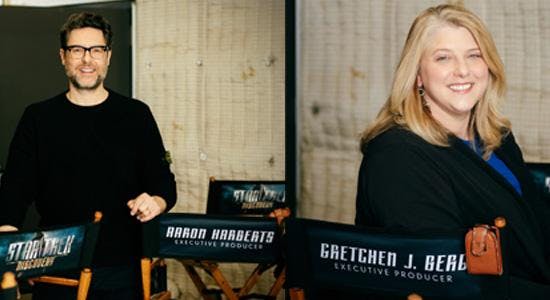
I had certainly had a lot of conversations with Aaron (Harberts) and Gretchen (J. Berg) about the overall story, generally speaking, and I knew all of the big points, from beginning to end. But I actually wanted to know even more than usual. I had found with this story, just because the universe is so vast and because there's these dueling ideologies with Michael Burnham, that I needed to know as much as I possibly could. So, I really appreciate Aaron and Gretchen for that, because they wanted from the very beginning to build a theater environment, a family environment where we talk about everything, we talk about the intricacies of the story.
How did those conversations pay off for you?
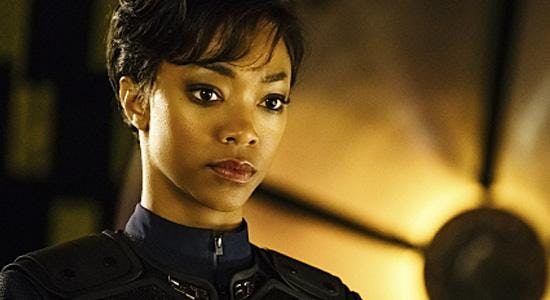
We were aimed from the beginning, then all the way throughout, in the same direction. Any questions that I had, any things that I needed to know to create Burnham, I knew I had an open door to talk about it. That being said, though, I still didn't know just how deep things were going to go, didn't know just how far things were going to go when it came down to the specifics. So, that was surprising and that was challenging in the best way.
Which first-season episode do you think best exemplifies Discovery when it's operating on all cylinders?
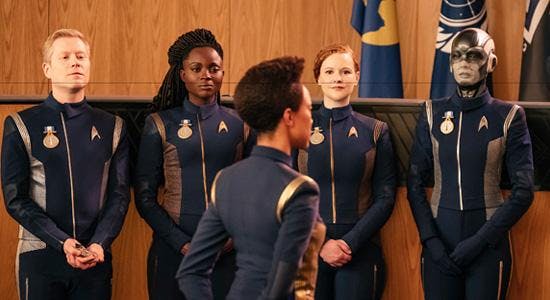
Let's see, which one put it all together? Now see, that's tough because when you talk about what put it all together, you could speak on it in terms of story, and then you could talk about the finale and talk about how that was the culmination of everything we had been going through. That really put everything together, in terms of the story. We see the war end, and we see all of these people reaching the point that they were trying to reach the whole time, with everyone getting their honors at the ceremony and whatnot, and Burnham being reinstated and Culber being recognized. So, you could say that episode works best in terms of story.
But then you could also say that one (“The Vulcan Hello”) works best, because that's the introduction of the story and that's where you saw it's the Shenzhou, not the Discovery. And you could say episode three (“Context Is for Kings”) is the best because that's when we get introduced to the Discovery. So, I don't know. Also, episode seven (“Magic to Make the Sanest Man Go Mad”) was cool as well, such a throwback. Essentially, I’m saying all of them! (laughs)
You had great a Burnham-Tyler farewell scene with Shazad Latif, actually several of them building up to the final goodbye. How tough were those to play, and how satisfied were you with the final one and where it leaves Michael heading into next season?
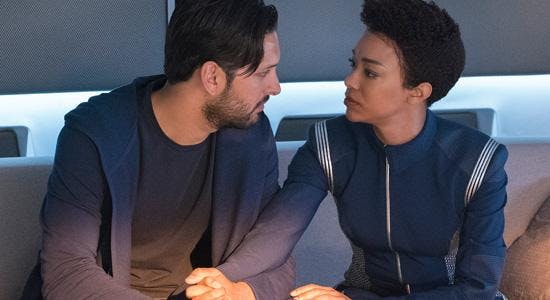
Shazad and I were very grateful to have that moment in 15 and to get to that place where we could say goodbye in such a peaceful, loving manner. We also got to acknowledge our love for each other, to acknowledge what we had, to acknowledge it was arduous and tumultuous, the journey, but then to know that what we're doing is what's best for the both of us going forward. I had already decided in 14 (“The War Without, The War Within”) that what was best is that he be on his own and decide these things and discover these things by himself. And then he realized the same thing.
I love what I say to him, when I say, "I now see you in your eyes." That was a moment of respect. That was a moment of gratification or justification. It was, "I see you. I see what you're doing. I see how you've changed and how you've grown and the new person you are now, what you're focusing to be." So, we really loved it. We really loved that we got that moment. Shazad and I loved everything leading up to it, all the moments that we were able to get, all of the scenes that we had been blessed with, and being able to shift the roles a little bit was really exciting for us, too.
I also appreciated the writing itself and how we were directed as well over the course of those moments. Like you said, we built to that goodbye. I loved the stuff in 9 (“Into the Forest I Go”) and 10 (“Despite Yourself”) as well. So, we thought that a lot of time was given to these two people and to this romance. It was really complicated and shaded and dark in a lot of ways, but then also there was such gentleness and there was such, I don't know, sweetness and love in it as well as the characters move forward. So, Shazad and I are both really grateful for how much we were able to do with each other.
When we spoke in San Diego last year, we discussed the role model aspect of this and you were excited to see how people reacted, how women of color and little girls and boys responded to you as Burnham. What kind of reaction have you heard from people, and what has it meant to you?
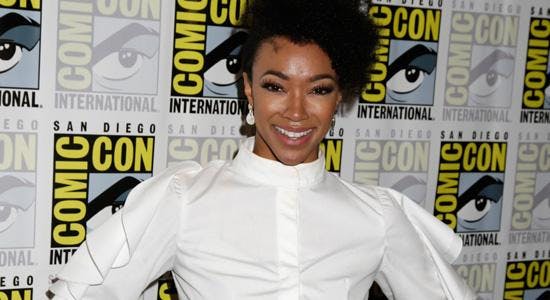
That's going to make me cry. You always make me cry. It's been overwhelmingly positive. What really gets me is girls being able to see this story, being able to see themselves reflected in me and reflected in all the women in our show. And then it doesn't stop with the girls. It continues with the boys. It's just really being able to show our youth such a strong, heroic, sacrificial, utopian picture. It means everything. And then being able to see, within the show, the end of racism as we know it now and being able to see equality across the board, across universes, it’s wonderful. Yes, you see us battling with Klingons, you see the Federation and the Klingon Empire going toe to toe, and you see the combating belief systems, but you see peace come in the end. I just feel you have to see a hero that looks like you in order to find the hero within, that's for sure. So, it means a lot that people are seeing that we get to be here and get to be involved in our own way with the solution. We get to be the solution, and we get to show you what a solution could look like.
Some people commented along that way that Discovery gave us Georgiou and Burnham, two women of color, but Georgiou was killed and Burnham was in jail for being a mutineer. The outcry was "You give us these women of color, then you do that to them." Anthony Rapp was the one who pointed out that it’s so rare, with Burnham, to see a person of color who's incarcerated and then able to earn their way back to redemption and is granted that redemption…
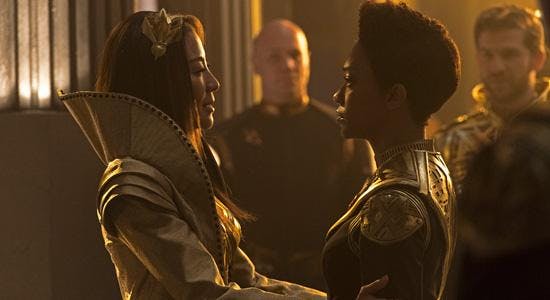
That's true, because we see these characters, we see these strong characters, but what I talk about all the time is the vulnerability that we don't always see and then, even more than that, these deep, moral problems and these moral mistakes, these slips in that morality. To see someone fall so far, that's very courageous and that's very risky as well, and so I appreciate that for people watching, it's not just this complete person (yet). The believability factor is through the roof because…
Because she's a work in progress?
A work in progress. And every character is, in a sense. But to see someone climbing, or as I say in episode 14, clawing, I think that's something everybody can relate to and it's something everyone needs to see. They need to see the progress and the process to the promise.
Discovery had its doubters among the fan base. With season one complete and season two soon to start filming, do you feel the show won over anyone who was a doubter heading into it or early on?
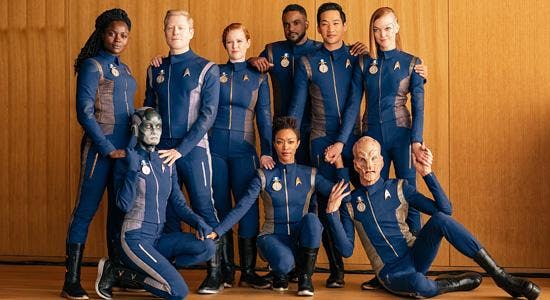
Even before the finale, even when we were still airing the earlier episodes from the first half of the season, people were saying, "I don’t know” or “I was cautious” or “I was anxious” or “I was tentative, but now I'm all in and I appreciate what you're doing. I think the world needs this new Trek, and we love it and we appreciate you." That means everything. It means everything to us to see people tuning into it and pulling it into their hearts, people who have always loved Star Trek, people who've never seen it, and then the people who weren't so sure about it in the beginning. It's amazing. We're so very grateful for it. We don't take it lightly.
All of Star Trek: Discovery's first season is available for streaming/viewing on CBS All Access in the U.S. and Space Channel in Canada. It's available on Netflix in the rest of the world.



